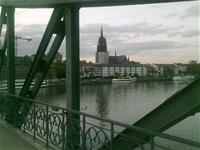Germany - a power, provoking fear and need
Adelina Marini, June 30, 2010
 For centuries the countries in Europe have been afraid of Germany's power. This became hysterical in the beginning of the 20th century and has inculcated the mind not only of the Europeans but of a large part of the world too after the World War II. In all this time, European politics was based on the principle "Germany must be held under control". Until the eurozone crisis when we see that it is on Berlin that protecting European unity and the survival of the single currency depend.
For centuries the countries in Europe have been afraid of Germany's power. This became hysterical in the beginning of the 20th century and has inculcated the mind not only of the Europeans but of a large part of the world too after the World War II. In all this time, European politics was based on the principle "Germany must be held under control". Until the eurozone crisis when we see that it is on Berlin that protecting European unity and the survival of the single currency depend.
There are almost no reasons in today's globalised world for fears like the one that prevailed in European political conscience in the 20th century. Instead, it seems that a large part of European countries still fear the economic power of the largest European economy. Probably it is this fear that is in the foundation of all calls Germany to restrain its export oriented economy and make Germans spend more at home in order to give its European partners a rest.
Such a call sounds the very least unfair, given the high European ideals for  solidarity, equality, prosperity and leading global positioning. Furthermore, these calls are against any economic logic. And this logic is simple - when there is someone to offer something and there is someone to buy it, there is a deal. And who is to blame when someone would prefer to buy it with credit because he had not earned any money? The producer or the consumer? Let the economists answer this.
solidarity, equality, prosperity and leading global positioning. Furthermore, these calls are against any economic logic. And this logic is simple - when there is someone to offer something and there is someone to buy it, there is a deal. And who is to blame when someone would prefer to buy it with credit because he had not earned any money? The producer or the consumer? Let the economists answer this.
Not less important is the question why the Germans do not spend at home as much as needed to compensate the huge trade surplus of their country abroad. And the answer is more than complicated and even the best economic experts, I'm afraid, miss its essence. And this essence is hidden in the subquestion - what do the Germans prefer to spend their money for? And another subquestion - about the structure of German economy and society.
The German is a highly disciplined man because he was taught what the butterfly effect means. This is why the German society is based on a solid foundation of rules, the violation of which costs dearly (it is more expensive than the short-term benefit from any fraud).
 The painful conclusion is that while the colonial countries like Britain and France, together with some close and not that close allies, tried to isolate Germany during the entire 20th century, they actually did good to the Germans and did harm to themselves. Because while the French relied on the magnificence of their cheese, the wine and Paris, and the British - on cheap raw materials from the former colonies, the Germans focused on building their country from the ruins. And they succeeded! And now - they are guilty again?
The painful conclusion is that while the colonial countries like Britain and France, together with some close and not that close allies, tried to isolate Germany during the entire 20th century, they actually did good to the Germans and did harm to themselves. Because while the French relied on the magnificence of their cheese, the wine and Paris, and the British - on cheap raw materials from the former colonies, the Germans focused on building their country from the ruins. And they succeeded! And now - they are guilty again?
They are guilty for not being quite happy with the fact that they have to help the Greeks whose economic "discipline" is at a level, hard to register by the current economic indicators. They are also guilty for the huge debt of the Spanish and the Italians who, no matter the evolution of modern technologies still insist on their siesta and all night long parties. They are guilty for the shortest working week ever - that of the French (35 hours), for their numerous national holidays, their long lunch breaks and their agriculture, absorbing billions of European money.
It is already an anecdote that everyone wants the money of the German taxpayers. It is interesting however, how long this would go on? Probably it won't take long the old idea of a Union within the Union to be realised - a Union of those who love to work and make money within the Union of those who gravitate around them and peep into their purse.
In the global aspect the situation of Europe seems much worse because there will  always be a market for German goods, no matter that they are more expensive (and they are more expensive because can be used longer, which from an economic point of view makes them cheaper). But not everyone would need an excursion to Paris or a vacation in Spain. But everyone who wants to do a good job would use German or any other North-European technology. And as Germany is still not well positioned in global institutions it needs the EU in order to promote its visions. And what would they be?
always be a market for German goods, no matter that they are more expensive (and they are more expensive because can be used longer, which from an economic point of view makes them cheaper). But not everyone would need an excursion to Paris or a vacation in Spain. But everyone who wants to do a good job would use German or any other North-European technology. And as Germany is still not well positioned in global institutions it needs the EU in order to promote its visions. And what would they be?